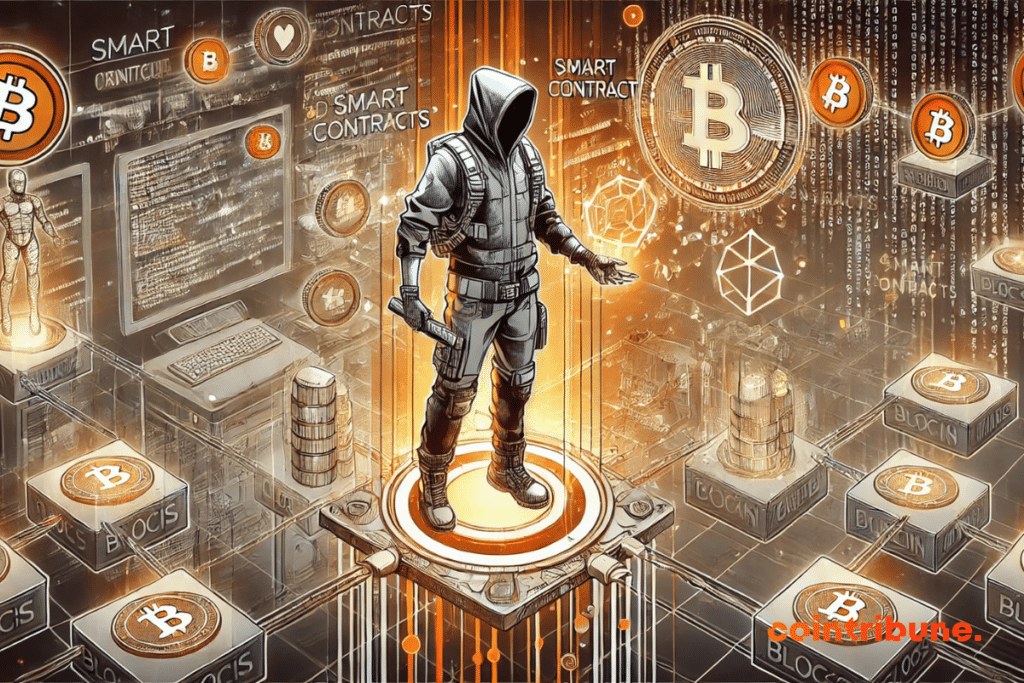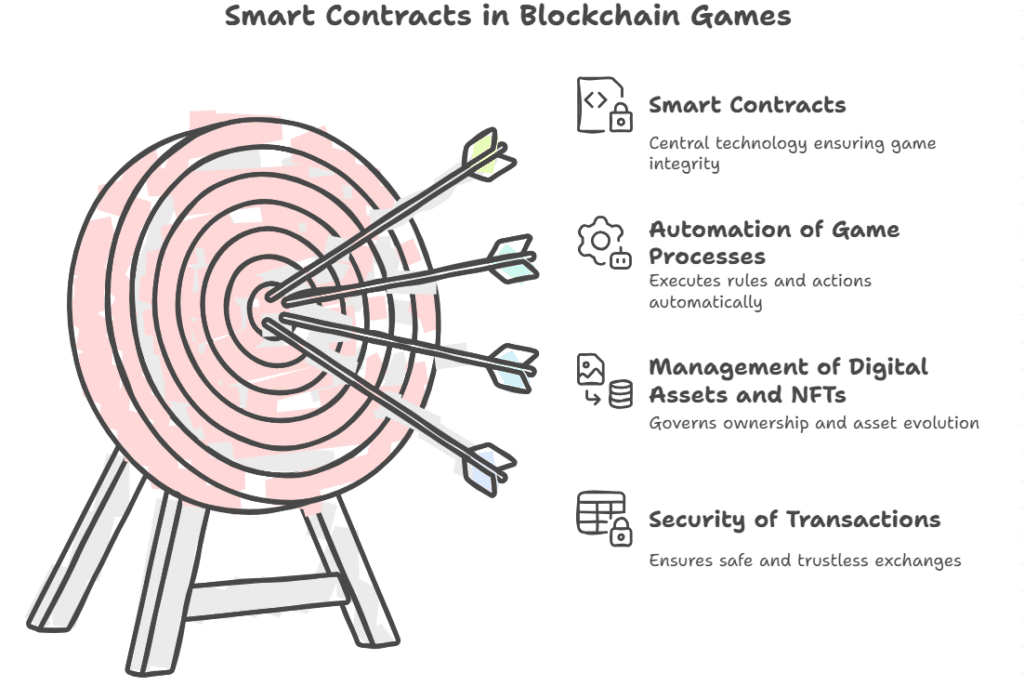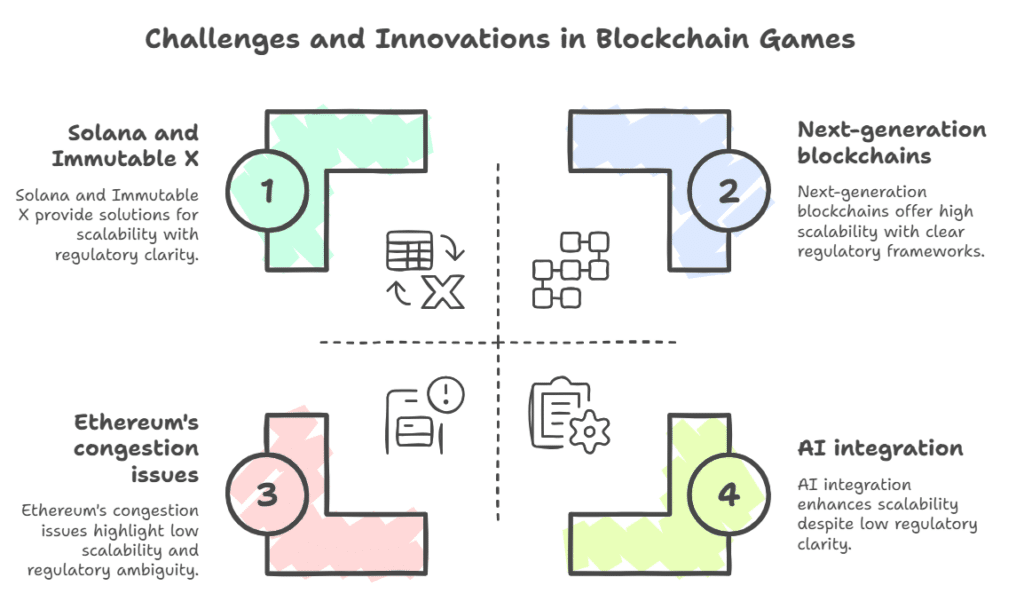What Is a Smart Contract in Blockchain Games?
Smart contracts automate the execution of game rules without intermediaries. They ensure transparency, security, and immutability of transactions. In blockchain games, these contracts allow players to truly own their digital assets. Developers integrate this technology to enhance trust and prevent fraud. The blockchain removes risks of manipulation and alteration of data. Smart contracts facilitate exchanges between players and create automated reward mechanisms. Their adoption transforms the gaming industry and offers a new decentralized economy. These innovations pave the way for fairer gaming experiences. We summarize it in this article.

In brief
- Definition: smart contracts are autonomous programs that automatically execute game rules on the blockchain, without intermediaries.
- Function: they guarantee transparency, security, and real ownership of digital assets in blockchain games.
- Usage: automate rewards, manage exchanges between players and ensure the authenticity of NFTs (items, characters, cards…).
- Limits: scalability issues, risks associated with immutable code, and still unclear legal frameworks across countries.
- Perspectives: faster blockchains, artificial intelligence, and common standards could improve efficiency and accelerate adoption in Web3 gaming.
What are smart contracts?
Smart contracts are at the heart of blockchain-based innovations. These autonomous programs enable predefined actions to be executed without intermediaries. Their adoption has transformed various sectors, including the video game industry.
The origin and evolution of smart contracts
Nick Szabo conceptualized smart contracts in 1994. He envisioned protocols capable of automating the execution of digital agreements. At the time, the technology did not permit large-scale implementation.
The emergence of blockchain made these contracts operational. Ethereum introduced smart contracts in 2015 with its virtual machine (EVM). This innovation allowed developers to create decentralized applications (DApps).
Since then, many blockchains, like Solana and Binance Smart Chain, have improved the performance of smart contracts. These developments have strengthened their adoption in finance, real estate, and video games.
The general functioning of smart contracts
Smart contracts operate based on a computer code deployed on a blockchain. They execute automatically when a predefined condition is met. A smart contract contains immutable instructions. Once activated, it cannot be modified. This feature ensures transparency and security of interactions.
Indeed, when a user triggers a smart contract, the network validates the action. If conditions are met, execution occurs without human intervention. This mechanism eliminates intermediaries and reduces processing times.
The advantages and limitations of smart contracts
Smart contracts offer several advantages. They ensure a reliable and quick execution of transactions. The absence of intermediaries reduces costs and manipulation risks. Their transparency enhances user trust.
In blockchain games, these contracts ensure real ownership of digital assets. They enable direct exchanges between players and facilitate the creation of decentralized economies.
However, some limitations persist. Errors in the code can lead to security vulnerabilities. Once deployed, a smart contract cannot be corrected without a protocol update.
Transaction fees vary depending on network congestion. Some blockchains, like Ethereum, suffer from high costs. Despite these challenges, smart contracts continue to evolve and improve their efficiency.
Blockchain games: a new era of gaming
Blockchain games are disrupting the Web3 gaming industry. They introduce innovative mechanics based on decentralization and digital ownership. Thanks to the blockchain, players enjoy total control over their assets and increased transparency.
Blockchain technology
Blockchain relies on a decentralized network of nodes. Each transaction is recorded in an immutable ledger. This system guarantees data integrity and prevents any fraudulent modification.
Public blockchains, like Ethereum and Solana, allow the execution of smart contracts. These protocols automate interactions without intermediaries. In gaming, this technology secures digital asset exchanges and ensures their authenticity.
Transactions on the blockchain occur in crypto. This feature offers a alternative to traditional payment systems. Blockchain games leverage this functionality to create autonomous and interoperable economies.
The integration of blockchain in the gaming industry
The gaming industry is gradually adopting blockchain. Many studios are developing games that incorporate NFTs and cryptos. These elements enhance player engagement and open new economic perspectives.
Blockchain games allow users to own and exchange their virtual items. Unlike traditional games, where assets remain under the control of publishers, blockchain guarantees true digital ownership.
Studios also leverage blockchain to develop decentralized games. These titles, called DApps, operate without a central server. Players interact directly with the smart contract, reducing risks of censorship or server shutdowns.
The advantages of blockchain games for players and developers

Blockchain games offer several advantages to players. They ensure total transparency of transactions and protect digital assets. Users can resell or transfer their items without restriction.
Economic models, such as the Play-to-Earn, allow players to generate income. By rewarding interactions, these games attract an engaged and active community.
Developers also benefit from blockchain. This technology simplifies asset management and reduces costs associated with centralized servers. Monetization becomes more flexible thanks to cryptos and NFTs.
Blockchain games mark a turning point for the video game industry. They pave the way for fairer experiences, where each player holds real power over their virtual universe.
The role of smart contracts in blockchain games
Smart contracts play a central role in blockchain games. They ensure the automatic execution of rules and guarantee the transparency of interactions. This technology enhances the player experience by eliminating intermediaries and securing exchanges.

The automation of game processes
Smart contracts allow for the automation of certain game mechanics. They execute predefined actions as soon as a condition is met. This functionality reduces dependence on centralized servers and eliminates human errors.
Quests, rewards, and player interactions follow precise rules embedded in the code. This automation ensures a smooth experience and prevents any external modifications. In competitive games, it guarantees fairness and removes the risk of cheating.
Smart contracts also facilitate the management of tournaments by assigning winnings instantly. Once the winner is designated, the contract automatically sends the reward to their wallet. This process reduces delays and ensures a transparent distribution of funds.
The management of digital assets and NFTs
Blockchain games integrate NFTs to represent unique objects and characters. Smart contracts record these assets on the blockchain and guarantee their authenticity. Each player owns their inventory without relying on a central platform.
Smart contracts govern the transfers of assets between players. Once the transaction is validated, the object immediately changes ownership. This technology prevents any duplication and preserves the rarity of NFTs.
Developers use these contracts to create item evolution systems. For example, a player can enhance a weapon by combining several elements. The smart contract automatically adjusts the characteristics and updates the asset on the blockchain.
The security of transactions and exchanges between players
Exchanges between players require mutual trust. Smart contracts guarantee the security of transactions by enforcing immutable rules. Once the conditions are met, the exchange occurs without the risk of fraud.
In traditional games, scams are common during virtual item sales. Smart contracts eliminate these risks by executing transactions automatically and irrevocably.
Blockchain-based marketplaces rely on these smart contracts. They allow players to buy and sell assets securely. The absence of intermediaries reduces fees and speeds up exchanges.
Smart contracts are revolutionizing blockchain games by making transactions reliable, instantaneous, and tamper-proof.
Practical cases: examples of games using smart contracts
Smart contracts have revolutionized the video game industry by introducing decentralized and transparent mechanisms. Here are four examples of games that leverage this technology to provide unique experiences for players.
CryptoKitties: collection and breeding of virtual cats
Launched in 2017, CryptoKitties is one of the first games to use smart contracts on the Ethereum blockchain. Players collect, buy, and sell unique virtual cats called CryptoKitties. Each cat has specific attributes determined by a smart contract, influencing its appearance and rarity. Users can also breed their cats to create new generations with inherited traits.
Illuvium: open-world role-playing game based on Ethereum
Illuvium is a open-world role-playing game built on the Ethereum blockchain. Players explore a vast universe, capture creatures called Illuvials, and participate in strategic battles. Smart contracts manage the ownership of Illuvials, ensuring their authenticity and rarity. Players can trade these creatures on decentralized marketplaces to benefit from true digital ownership.
0xUniverse: space exploration and planet colonization
0xUniverse is a space simulation game where players explore the universe and colonize planets. Each planet is a unique NFT secured by smart contracts on the Ethereum blockchain. Players build spaceships, discover new planets, and exploit their resources. Smart contracts guarantee the ownership of planets and facilitate transactions between players, creating a decentralized economy.
Sorare: sports simulation game with digital player cards
Sorare is a fantasy football game that uses digital player cards in the form of NFTs. Smart contracts ensure the authenticity and rarity of each card, allowing players to collect, trade, and use these cards in online competitions. The real performances of players influence game results, providing an immersive and interactive experience.
These examples illustrate how smart contracts transform the landscape of video games by introducing decentralized, transparent, and secure mechanisms. Players benefit from true digital ownership, while developers can create innovative and engaging virtual economies.
The challenges and perspectives of smart contracts in blockchain games
Smart contracts offer unique opportunities for the video game industry. However, several technical and regulatory challenges slow down their adoption. Improving these technologies remains essential to ensure their expansion.

Scalability and performance issues
Current blockchains face limits in terms of scalability. The execution of smart contracts incurs high transaction fees and long validation times on networks like Ethereum.
Blockchain games require frequent interactions between players. Network congestion slows down these exchanges and degrades the user experience. Some blockchains, such as Solana and Immutable X, offer solutions to accelerate transactions and reduce costs.
Legal and regulatory questions
Smart contracts raise complex legal questions. Legislators struggle to regulate these decentralized protocols, particularly regarding digital ownership and consumer protection.
Some countries impose restrictions on the use of cryptocurrencies and NFTs. This legal uncertainty hampers investment and innovation in blockchain games. Clear and tailored regulation could encourage their widespread adoption.
Future developments and potential innovations
Technological advancements will improve the efficiency of smart contracts. The rise of next-generation blockchains, like Polkadot and Avalanche, promises better scalability.
The integration of artificial intelligence could optimize the management of smart contracts by enhancing their security. New solutions, like rollups and sidechains, will provide alternatives to accelerate transactions while reducing costs.
The future of blockchain games will depend on these innovations and their adoption by the industry.
Smart contracts are transforming the video game industry by ensuring transparency, security, and digital ownership. They automate game rules, secure exchanges, and facilitate the management of digital assets. Several blockchain games leverage this technology to provide decentralized experiences. However, challenges remain, particularly regarding scalability and regulation. The evolution of blockchains and optimization solutions could improve their adoption. The rise of smart contracts paves the way for a new model of operation in gaming, where players have full control over their assets and interact without intermediaries in autonomous digital universes.

FAQ
No, once deployed on the blockchain, smart contracts are immutable. However, solutions like proxy smart contracts allow updates by bypassing this limitation.
No, some games use blockchain only for transactions or NFTs without automating rules through smart contracts. Their use depends on the game’s needs and the level of decentralization desired.
Yes, if they contain vulnerabilities in their code, they can be exploited by hackers. This is why security audits are essential before deployment.
Maximize your Cointribune experience with our "Read to Earn" program! For every article you read, earn points and access exclusive rewards. Sign up now and start earning benefits.
Diplômé de Sciences Po Toulouse et titulaire d'une certification consultant blockchain délivrée par Alyra, j'ai rejoint l'aventure Cointribune en 2019. Convaincu du potentiel de la blockchain pour transformer de nombreux secteurs de l'économie, j'ai pris l'engagement de sensibiliser et d'informer le grand public sur cet écosystème en constante évolution. Mon objectif est de permettre à chacun de mieux comprendre la blockchain et de saisir les opportunités qu'elle offre. Je m'efforce chaque jour de fournir une analyse objective de l'actualité, de décrypter les tendances du marché, de relayer les dernières innovations technologiques et de mettre en perspective les enjeux économiques et sociétaux de cette révolution en marche.
The views, thoughts, and opinions expressed in this article belong solely to the author, and should not be taken as investment advice. Do your own research before taking any investment decisions.